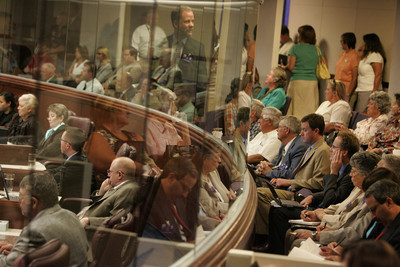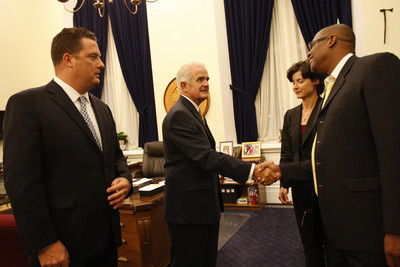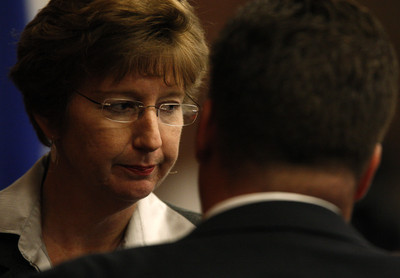Lawmakers cut the tape
CARSON CITY -- By legislative standards, it was a four-minute mile.
With a route charted beforehand, the Nevada Legislature managed to go the distance Friday in a rare special session, approving $275 million in budget cuts to balance the budget for the fiscal year that starts Tuesday.
That's not to say there weren't a few bumps in the road. But conflicting budget plans and other disputes that could have extended the session for days, if not weeks, did not materialize.
In a speech to the Assembly early in the day, Speaker Barbara Buckley, D-Las Vegas, said: "The governor challenged lawmakers to meet this serious challenge, and meet it we will."
Senate Majority Leader Bill Raggio, R-Reno, predicted early on that lawmakers would finish in one day.
He was right. The Legislature adjourned a little over 12 hours after starting a process that Buckley said she never wanted to see repeated: cuts to a two-year budget that had already seen over $900 million in reductions and the consumption of the state's entire rainy day fund.
Following adjournment, Gov. Jim Gibbons said he would review the approved bills in detail, but late Friday night he saw no problem in signing them into law.
He congratulated legislators for finding places to make $275 million in budget cuts without raising taxes, but predicted more tough times until the economy recovers.
Money for an expansion of all-day kindergarten and for the creation of empowerment schools, approved by lawmakers a little over a year ago, had already fallen under the ax in earlier rounds of cuts. Capital projects had been eliminated and prisons closed.
But the continuing economic slump made further cuts necessary. And Gibbons decided to call lawmakers in to help decide what to cut.
With the end of their special session in sight late Friday night, lawmakers were satisfied with their work, unpleasant though it may have been.
"We had some tough decisions to make," Raggio said. "We did it without raising taxes, and as I understand it, without laying off workers."
But Raggio said he was disappointed by what he called partisanship on the part of Senate Democrats near the end of the long day, particularly in a fight over cutting money for textbooks.
Senate Minority Leader Steven Horsford, D-Las Vegas, however, said he had never agreed in leadership budget negotiations that preceded the special session to cut textbooks. And when Senate Republicans earlier in the day killed a bill to collect millions in tax revenue from the gaming industry on the free meals they provide patrons and employees, Horsford decided to oppose the education cut.
The day got off to a smooth start.
Several bills implementing the plan, including a measure freeing up nearly $20 million in various legislative accounts to help fill the gap, were approved quickly by both houses of the Legislature and sent to Gibbons for his signature.
The deal approved by the Legislature includes cutting the textbook fund by half, generating $48 million, and implementing agency spending reductions worth $106 million. The reductions, which average 3 percent, will hit higher education and public education as well, but the cuts will be targeted, not across-the-board. The textbook money will not be cut if state tax revenues come in above expectations.
Except for three or four items, Gibbons said, the compromise reached by the Legislature was no different than the solution he advanced. The governor said he did not favor cutting textbook spending, but quickly added: "Politics is the art of compromise."
While the current budget may now be balanced, lawmakers face an even tougher challenge when they convene in February in their regular session. Even more cuts might be needed if the economy does not begin to turn around for the next two-year budget.
Gibbons is asking for 14 percent cuts from current spending levels in the 2009-2011 budget.
"I think it is pathetic our economy is not doing better than it is," said Gibbons.
The governor said he will be proposing a no-growth budget for the two-year period of July 1, 2009 through June 30, 2011 and continue to adhere to his pledge to veto any bills that raise taxes. He acknowledged that will mean a cut in services.
One glitch in Friday's special session -- which began, surprisingly enough, almost on time at 10 a.m. -- was a gaming industry blind-sided over the bill to erase about $150 million in refunds due them because of a controversial Nevada Supreme Court ruling on taxing comped meals.
Bill Bible, president of the Nevada Resort Association, said members of the association were contacted to assess their position on Assembly Bill 2, which was intended to sidestep a Supreme Court ruling involving the Sparks Nugget. The court ruling stated taxes do not have to be paid on free meals provided to employees and patrons.
The issue became moot when the 11 GOP members of the Senate refused to support the measure.
Dying with the bill were potential amendments by Sen. Terry Care, D-Las Vegas, to eliminate "green" tax breaks to several Strip casino projects for environmental improvements, and another by Sen. Dina Titus D-Las Vegas, to allow Nevada to participate in any potential federal gasoline tax holidays.
The defeat of the AB2 did not affect the budget accord, however. The potential cost to the state of tax money lost on comped meals was not factored in to the $275 million shortfall because the decision on the court ruling is not final. The Supreme Court has been asked to reconsider its position, but has not yet made a decision.
Dino DiCianno, executive director of the Department of Taxation, said requests for refunds from casinos and restaurants as a result of the court ruling, now are worth $150 million. About $50 million of the total would come from state coffers.
The tax had been collected until the Supreme Court ruling.
Gibbons and many lawmakers said they wanted the bill to keep the potential $50 million hit to the state from becoming a reality later on.
But the measure, which passed the Assembly unanimously, bogged down in the Senate when the gaming industry concerns arose.
Robert Uithoven, representing the Las Vegas Sands Corp., said the company was opposed to the bill because it appeared the Legislature was trying to change a court decision it did not like. The bill was also retroactive, and would take away refunds owed to a number of hotel-casinos if it became law, he said.
"It is a substantial amount of money for each property," Uithoven said.
While the budget-balancing process flowed smoothly in the Assembly, Senate Democrats tried several times to amend bills as they made their way through the legislative process.
Horsford sought to amend the bill to cut textbook funding. His amendment would have expanded the authority of a new panel looking at how to eliminate government waste to include an examination of education funding issues. He also wanted to expand the panel to include lawmakers and to look at whether educational opportunities were equitable across the state.
Horsford said he was told by Spending and Government Efficiency Commission Chairman Bruce James that the panel does not have the authority to look for efficiencies in either higher education or public education budgets.
Raggio initially refused to accept the motion, saying the issue was not germane to the bill.
A vote was eventually allowed, and it failed on an 11-10 party line vote with Republicans opposing the measure.
Senate Democrats carried their fight to the floor votes as well, causing tempers to flare as the day wore on.
Horsford stood on the Senate floor to oppose Senate Bill 5, the bill to cut the textbook money. Schools in his district do not have enough textbooks, he said.
"I believe there are alternatives, there are other areas in this budget that could be cut," he said.
Raggio said Horsford and Senate Democrats had agreed to the bipartisan deal on the budget, including the textbook cut, which came from Nevada school superintendents as an alternative to cutting a 4 percent cost-of-living raise for teachers.
"All of a sudden everything has turned into a partisan display," Raggio said. "All of us have education as our first priority. So don't use this for campaign purposes."
But Titus said the choices made by some lawmakers were plain wrong. She cited the support for cutting textbook money while at the same time rejecting an effort to collect taxes on comped meals provided by the gaming industry.
The textbook-cutting bill passed on a 12-9 vote on party lines except for Sen. John Lee, D-North Las Vegas, who voted in the majority with 11 Republicans.
There was a lot of angst, but also 40 votes, for the textbook bill in the Assembly.
Assemblyman Garn Mabey, R-Las Vegas, a physician, compared the legislators' work to a surgeon operating on a patient.
"You do the best you can and finally let the body heal itself," Mabey said.
PROPOSED CUTS
The Senate-Assembly compromise plan to cut state spending by $275 million
• Cut state agency operating expenditures by an average of 3 percent. The Legislature's Interim Finance Committee will approve the cuts. Saves $106.6 million.
• Return to the general fund money appropriated by the 2007 Legislature for pavement preservation projects. Adds $50 million.
• Reduce by 50 percent funding to purchase textbooks. If revenue projections in December show a smaller shortfall than predicted, the funds will be restored. Saves $48 million.
• Direct some Trust Fund for Public Health dollars to the general fund. Adds $27.3 million.
• Transfer some tobacco settlement funds to the general fund. Adds $8.6 million.
• Transfer $7.6 million in unclaimed property funds to the general fund. Adds $7.6 million.
• Recover revenue through a tax amnesty program. Adds $4 million.
• Direct some Disaster Relief Account dollars to the general fund. Adds $4 million.
• Take some of the Criminal History Repository reserve fund. Adds $4 million.
• Transfer to the general fund some money in a fund to care for low-level nuclear waste sites. Adds $4 million.
• Revert to the IFC some of the Homeowner's Disaster Relief Fund. Adds $3.5 million.
• Tap some of the Mortgage Lending Reserve Fund. Adds $3.5 million.
• Transfer some SeniorRX program reserve funds to the general fund. Adds $3 million.
• Take some of the reserves of the Industry Development Revenue Bond Fund. Adds $800,000.
• Revert to the IFC unused youth parole funds. Adds $330,757.
• Revert back to the general fund unused Health Care Committee funds. Adds $200,000.

























